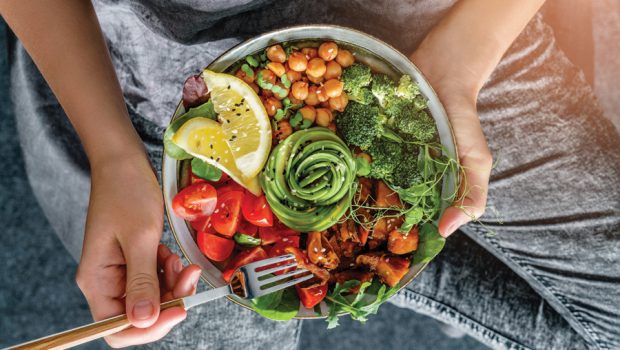ZENFUL EATING
Mindful Meals in Quiet Gratitude
by April Thompson
In Zen monasteries, the head cook (known as the tenzo) is one of the most important positions a monk can hold; Eihei Dogen, founder of Soto Zen, one of the longest-established sects of Buddhism, said this is “because the position requires wholehearted practice.” In the 13th-century volume Instructions for the Zen Cook, Dogen wrote, “In preparing food, it is essential to be sincere and to respect each ingredient, regardless of how coarse or fine.”
Rituals around food are an important element of Buddhism, as with many spiritual traditions. But we don’t have to be a Buddhist or a practiced meditator to learn how to cook more mindfully, enjoy meals more fully and eat in better balance.
“Cooking can be a meditation. We cook with all our senses: We taste, touch and listen to determine if the pan is hot enough. You just have to be mindful,” says Jean-Philippe Cyr, author of The Buddhist Chef: 100 Simple, Feel-Good Vegan Recipes.
“Cooking is an act of love and generosity, so cooking should be done with caretaking the time to consider the ingredients and overall flavors of the meal, storing the vegetables properly, paying attention while you chop. These things are the foundation of a great meal,” says Gesshin Claire Greenwood, an ordained Zen priest in San Francisco. Greenwood trained in Buddhist monasteries in Japan for more than five years, experiences she draws from in her recent memoir and cookbook Just Enough: Vegan Recipes and Stories from Japan’s Buddhist Temples.
While vegetarianism is encouraged in all schools of Buddhism and most monasteries abstain from meat, it is not a strict requirement. Cyr, a vegan and practicing Buddhist of 20 years, takes seriously the concept of ahimsa, or “do no harm”, as a chef. “Veganism and Buddhism share the common value of compassion—compassion towards animals, as well as the Earth. Climate change caused by meat consumption causes a lot of harm, too,” says Cyr, of rural Quebec, Canada.
The “middle way” is an important Buddhist principle in the kitchen—striking the balance between indulgence and deprivation—the “just enough” in Greenwood’s cookbook title. “It’s important to use enough salt so that the food tastes good, but not so much that it’s overpowering. When we shop for food or eat a meal, we can also pay attention to when we’ve had enough,” she says.
Mind Over Mouth
Mindful eating can open up a beautiful new relationship to food, says Jan Chozen Bays, a Zen Buddhist priest and co-abbot of Great Vow Zen Monastery, in Clatskanie, Oregon. “This country is in an epidemic of out-of-balance eating. People are stressed out and fearful about eating, but cooking and eating should be inherently pleasurable human activities,” says Bays, the author of Mindful Eating: A Guide to Rediscovering a Healthy and Joyful Relationship with Food. “In Zen practice, mindful rituals help us learn to be present and peaceful during meals.”
Mindful eating is not about restrictions, but rather about curiosity and investigation—an adventure for the senses, says Bays. “Research shows that diets don’t work, as they rely on external sources rather than helping you to go inward and tap into the innate wisdom of your body.”
Tuning In at Mealtime
Rushing through meals mindlessly, we’ve become deaf to our body’s own signals of satiety, says Bays. “Go to the supermarket when you’re hungry, and head to the perimeter where the real food is and stop and ask your body, ‘Would you like oranges? Would broccoli be good for us?’ Tune into your cellular hunger,” she says.
At the Great Vow Zen Monastery, the first morning meal is conducted in silence, along “with a prayer to bring gratitude for the food and to all living beings whose life flows to us in our food,” says Bays, adding that research shows ceremonies and moments of reflection lead to more mindful, healthy eating.
“Instead of talking on the phone, try cooking in silence. Drawing your awareness to details like the smell of basil, the color of tomato and the touch of the spoon brings so much richness to the act of cooking,” says Bays.
Such a focus leads to a sense of appreciation for the ingredients of meals and life, says Myoju Erin Merk, a priest at the San Francisco Zen Center. “Making a meal is an active extension of our ‘sitting’ (meditation) practice.”
Connect with Washington, D.C. freelance writer April Thompson at AprilWrites.com.
<












